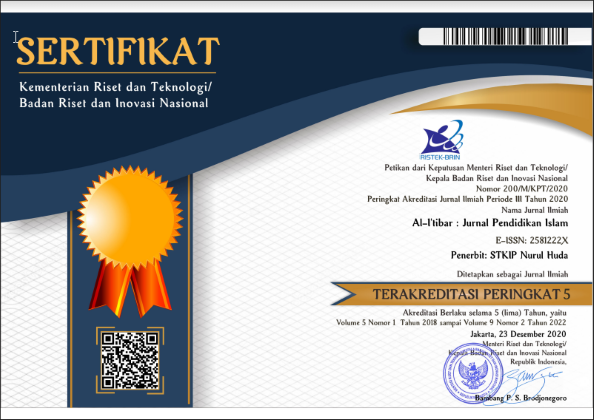Comparison Of Management Of Nihayatul Amal Islamic Boarding School In Central Karawang Regency With Al-Muhajirin Islamic Boarding School In Purwakarta Regency
Universitas Islam Indonesia
DOI:
https://doi.org/10.30599/jpia.v11i1.3318Keywords:
Islamic Boarding School, Management, Nihayatul Amal, Al-MuhajirinAbstract
This article discusses the comparison of management at the Nihayatul Amal and Al-Muhajirin Islamic boarding schools, with the aim of knowing the similarities, differences, disadvantages and advantages between the two. Then this article is in the form of qualitative research with a critical analysis approach to the two Islamic boarding schools, and the data taken is the result of searching for previous research such as journals, books and so on as well as interviews with the alumni concerned. The result obtained is that these two Islamic boarding schools have their own characteristics, especially in terms of curriculum where the Nihayatul Amal boarding school is more inclined to the classical system but the Al-Muhajirin pesantren uses an integration system between classical and modern, as well as from the organization of the Al-Muhajirin pesantren they recruit service students who have been declared to have passed strata 1 while in the Nihayatul Amal boarding school only service students have participating in PKL activities, and from an institutional point of view, Nihayatul Amal has the status of a pure Islamic boarding school while Al-Muhajirin has the status of a foundation.
Downloads
References
Asror, M., Mahfudloh, R. I., Kusaeri, K., & ... (2023). Educational Innovation in Indonesian and Malaysian Islamic Boarding Schools in Facing the Challenges of the 21st Century. Jurnal …, 14(1), 27–50. https://journal.unimma.ac.id/index.php/tarbiyatuna/article/view/8802
Da’i, M., Ramadhan, N., & Rohman, A. (2023). Comparison of Physical Fitness Levels between Boarding School Students based on Islamic Boarding School and Formal School Students. Journal Coaching Education Sports, 4(1), 140–152. https://doi.org/10.31599/jces.v4i1.1876
Diana, S., & Zaini, A. W. (2023). Nurturing Excellence: Leveraging Service Quality for Competitive Advantage in Islamic Boarding Schools. Journal of Educational Management Research, 2(1), 13–28. https://doi.org/10.61987/jemr.v2i1.280
Fahma, A., Salsabillah, A., & Rizky, M. (2024). Manajemen Keuangan Di Madrasah Aliyah Swasta Pesantren Ar- Raudlatul Hasanah Medan. 11(1), 37–42.
Fawaid, A., Abdullah, A., & Huda, M. (2023). Re-Designing Independent Campus Model in Islamic Boarding School Higher Education. Al-Tanzim: Jurnal Manajemen Pendidikan Islam, 7(4), 1202–1220.
Hendri, P., Andriesgo, J., & Andrizal, A. (2019). Penerapan Metode Metafora Berbantu Media Gambar pada Pelajaran PAI untuk Meningkatkan Keaktifan Belajar Siswa Kelas V SD Negeri 013 Pulau Kalimanting. Al-I’tibar : Jurnal Pendidikan Islam, 6(1), 19–27. https://doi.org/10.30599/jpia.v6i1.506
Hidayat, M. W., & Janan, M. (2023). ENHANCING MORAL INTEGRITY : ISLAMIC EDUCATION ’ S ROLE IN FOSTERING SUPERIOR CHARACTER WITHIN ISLAMIC BOARDING SCHOOL MANAGEMENT. 5(2), 155–164.
Mardalis, A., Ahmadi, M. A., Shobahiya, M., & Saleh, M. (2021). Identifying the Culture of the Muhammadiyah Islamic Boarding School. International Journal of Educational Management and Innovation, 2(3), 272. https://doi.org/10.12928/ijemi.v2i3.4043
Munir, M. S., & Ahmad, K. I. (2020). Santri Management at Modern and Salafiyah Islamic Boarding Schools. Journal of K6 Education and Management, 3(3), 390–400. https://doi.org/10.11594/jk6em.03.03.11
Pasi, K. M., Rasyidin, R., & Harahap, R. M. (2020). Education System of Modern Islamic Boarding School in The Postmodern Era. Nazhruna: Jurnal Pendidikan Islam, 3(3), 311–323. https://doi.org/10.31538/nzh.v3i3.805
Rahtikawatie, Y., Chalim, S., & Ratnasih, T. (2021). Investigating The Role of Religious Leadership at Indonesia’s Islamic Boarding Schools in The Sustainability of School Management. Eurasian Journal of Educational Research, 2021(96), 51–65. https://doi.org/10.14689/ejer.2021.96.4
Rusmalita, S., Patmawati, P., & Waldan, R. (2023). Mentoring for Success: Transforming Religious Tourism Management at Islamic Boarding School. Khazanah Sosial, 5(2), 331–344. https://doi.org/10.15575/ks.v5i2.24768
Sari, M. M. E. (2017). The Role of Learning Management of Islamic Boarding School (Pesantren) in Improvement of Their Student Religious. International Journal of Innovation and Applied Studies, 19(1), 30. http://www.ijias.issr-journals.org/
Sugiyono. (2018). Metode Penelitian Kualitatif. Alfabeta.
Supangat, Aflatun Muchtar, & Ismail Sukardi. (2023). Manajemen Mutu Madrasah Aliyah Swasta di Pondok Pesantren (Studi kasus pada Madrasah Aliyah Al-Ikhlas Pemetung Basuki, Madrasah Aliyah Nurul Huda Sukaraja dan Madrasah Aliyah Sidogede di Kabupaten OKU Timur). Al-I’tibar : Jurnal Pendidikan Islam, 10(1), 39–49. https://doi.org/10.30599/jpia.v10i1.2112
Zahraini, Situmorang, B., & Rosnelli. (2022). Development of Traditional Management Model of Traditional Islamic Boarding School Education Based on Total Quality Management in Islamic Education ( Tqm-Ie ) in Aceh Province , Indonesia. Journal of Positive School Psychology, 6(5), 7355–7377. https://www.journalppw.com/index.php/jpsp/article/view/8562/5600
Downloads
Published
How to Cite
Issue
Section
License
Copyright (c) 2024 Shihabul Millah

This work is licensed under a Creative Commons Attribution 4.0 International License.




